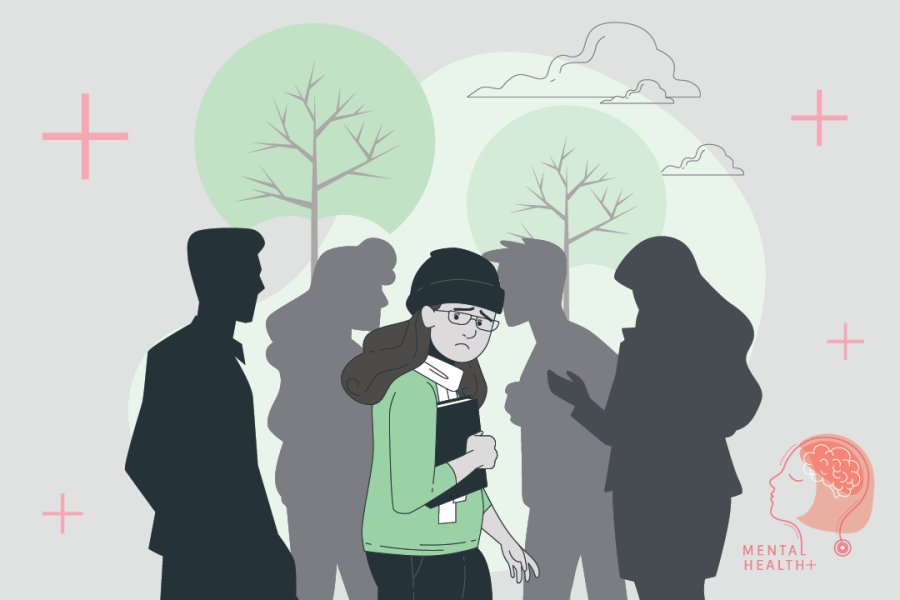Mental Health Talks: students reintroduce themselves to the world
Social anxiety appears to be a growing trend with students on Washburn’s campus and with Counseling Services. Students don’t seem to be comforted by the relaxed mask policies.
On Friday, March 4, 2022, Washburn University relaxed its mask policy for most of campus. Some students and faculty saw each other’s faces for the first time while others kept their masks on. However, while many students, faculty and staff have been without masks for a few months, there appears to be a growing level of social anxiety sweeping across campus.
According to the CDC, the percentage of adults reporting symptoms of anxiety or depression increased from 36.4% to 41.5% from August, 2020, to February, 2021. While everyone is already on edge, campus counselors have noticed a new trend appearing from the student body.
“We’re seeing a lot of anxiety and stress around the re-entering of daily life,” said Molly Steffes-Herman, a Washburn University student advocate and campus counselor.
Sean Lavin, a senior technology administration major, struggles with online classes but said that facing the world again sometimes appears the bigger of the two beasts.
“It’s like I’ve been reset to my Washburn Tech days when I would never really talk, or even farther back to my high school days when I never talked in class at all,” Lavin said.
Lavin is one of many students who feels overwhelmed when trying to navigate how to socially engage with students, faculty or potential employers without a mask on. Lavin said the anxiety of being reintroduced into society as a whole is a big stressor for him.
“There’s physical cues and behavioral cues that you don’t get when someone’s face is covered up. So, when you put a mask on somebody, I feel like I’m already working with one hand tied behind my back,” Lavin said. “All the social skills I had built up, and the confidence I built up, it all just regressed and now it’s like I have both hands tied behind my back.”
From Steffes-Herman’s point of view as a counselor, becoming relaxed with Zoom and online interactions has made it difficult for students to go back to what life was like before the pandemic.
“Interacting with people in-person as opposed to online, being able to connect with people with in-person events, those are things we haven’t really been able to do in two plus years,” Steffes-Herman said. “Getting comfortable with the new normal is more the issue. We’re able to gather and be in each other’s physical presence. It’s definitely been a change people have had to cope with.”
Samantha Peters, a senior mass media major, described her mask as a tool of emotional support.
“The masks became like a security blanket. No one knew who I was,” Peters said. “Now, we have the option to not wear them on campus and I almost start to panic. It’s almost kind of getting used to people all over again.”
Prior to the pandemic, Peters described she was comfortable with talking with others, especially employers. Being able to remove a mask this semester, after wearing a mask for so long, challenges feelings of trust Peters has with others and greatly increases her anxiety.
“It’s kind of like a baby being born back into the world,” Peters said. “Yes, the pandemic happened but, again, I had my security blanket with me so I was okay. And now, because I can go without it, I have to learn how to be okay all over again.”
As restrictions related to the pandemic slowly relax over the rest of the U.S., feeling additional stress from relearning how to socialize with others is to be expected and encouraged.
“Be aware of how you’re feeling. Check in with yourself. Acknowledge your feelings,” Steffes-Herman said. “Talk with people about how you feel. Talk with friends and family about what you are experiencing. Reach out and talk to a professional. But don’t ignore those feelings. Address them and give yourself time to talk through about how you’re feeling because that’s important.”
Edited by: Alyssa Storm, Glorianna Noland
Your donation will support the student journalists of Washburn University. Your contribution will allow us to purchase equipment and cover our annual website hosting costs.









